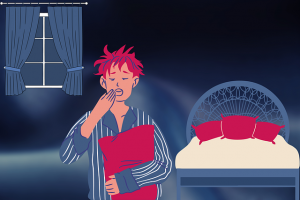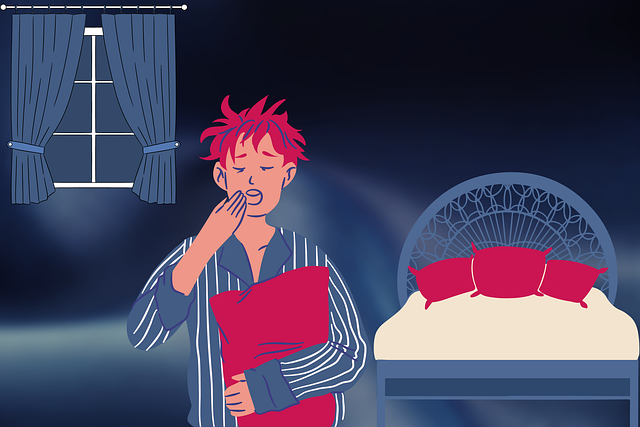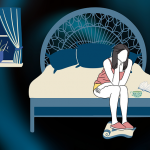Insomnia is a sleep disorder that affects millions of people worldwide. It is characterized by difficulty falling asleep, staying asleep, or waking up too early and not being able to go back to sleep. Insomnia can be acute, lasting for a few days or weeks, or chronic, lasting for months or even years. It can have a significant impact on daily life, causing fatigue, irritability, and difficulty concentrating.
According to the American Sleep Association, approximately 30% of adults in the United States experience symptoms of insomnia. Women are more likely than men to experience insomnia, and it becomes more common with age.
Insomnia can be caused by a variety of factors, including psychological factors such as stress and anxiety, medical conditions such as chronic pain and sleep apnea, and lifestyle factors such as poor sleep habits and caffeine intake.
Causes of Insomnia
 Psychological factors such as stress, anxiety, and depression are common causes of insomnia. When we are stressed or anxious, our bodies release hormones that can interfere with sleep. Chronic stress can lead to long-term insomnia if not addressed. Depression can also cause insomnia, as it can disrupt the body’s natural sleep-wake cycle.
Psychological factors such as stress, anxiety, and depression are common causes of insomnia. When we are stressed or anxious, our bodies release hormones that can interfere with sleep. Chronic stress can lead to long-term insomnia if not addressed. Depression can also cause insomnia, as it can disrupt the body’s natural sleep-wake cycle.
Medical conditions such as chronic pain and sleep apnea can also cause insomnia. Chronic pain can make it difficult to fall asleep or stay asleep throughout the night. Sleep apnea is a condition in which breathing is interrupted during sleep, leading to poor quality sleep and daytime fatigue.
Lifestyle factors such as poor sleep habits and caffeine intake can also contribute to insomnia. Irregular sleep schedules and staying up late at night can disrupt the body’s natural sleep-wake cycle. Consuming caffeine late in the day can also interfere with falling asleep at night.
The Benefits of a Good Night’s Sleep
Getting a good night’s sleep is essential for overall health and well-being. It has numerous benefits for both physical and mental health. Improved mood and mental health are among the most significant benefits of a good night’s sleep. Lack of sleep can lead to irritability, mood swings, and difficulty concentrating. Getting enough sleep can improve mood, reduce stress, and increase overall well-being.
Increased productivity and focus are also benefits of a good night’s sleep. When we are well-rested, we are better able to concentrate and perform tasks efficiently. This can lead to increased productivity at work or school.
Better physical health and immune function are also benefits of a good night’s sleep. Sleep is essential for the body to repair and regenerate cells. Lack of sleep can weaken the immune system, making us more susceptible to illness.
Sleep Hygiene Habits to Follow
Establishing good sleep hygiene habits is essential for getting a good night’s sleep. Some habits to follow include establishing a regular sleep schedule, creating a relaxing bedtime routine, avoiding stimulating activities before bed, and creating a comfortable sleep environment.
Establishing a regular sleep schedule involves going to bed and waking up at the same time every day, even on weekends. This helps regulate the body’s natural sleep-wake cycle.
Creating a relaxing bedtime routine can help signal to the body that it is time to wind down for the night. This can include activities such as taking a warm bath or shower, reading a book, or practicing relaxation techniques such as deep breathing or meditation.
Avoiding stimulating activities before bed is also important for getting a good night’s sleep. This includes avoiding electronic devices such as smartphones and tablets, as the blue light emitted by these devices can interfere with the body’s natural production of melatonin.
Creating a comfortable sleep environment involves ensuring that the bedroom is cool, dark, and quiet. Investing in comfortable bedding and pillows can also help create a comfortable sleeping environment.
Natural Remedies for Insomnia
There are several natural remedies that can be used to treat insomnia. Herbal supplements such as valerian root and chamomile have been shown to have a calming effect on the body and can help promote sleep. Relaxation techniques such as yoga, hypnosis and meditation can also help reduce stress and promote relaxation.
Aromatherapy using essential oils such as lavender can also be effective in promoting sleep. Lavender has a calming effect on the body and can help reduce anxiety and promote relaxation.
Medication Options for Insomnia
Over-the-counter sleep aids such as melatonin and antihistamines can be effective in treating insomnia. Melatonin is a hormone that helps regulate the body’s natural sleep-wake cycle, while antihistamines have a sedative effect on the body.
Prescription sleep medications such as benzodiazepines and non-benzodiazepines can also be effective in treating insomnia. These medications work by slowing down brain activity, making it easier to fall asleep.
It is important to note that these medications should only be used under the guidance of a healthcare professional, as they can have side effects and may be habit-forming.
Professional Help for Chronic Insomnia
For those who suffer from chronic insomnia, professional help may be necessary. Cognitive-behavioral therapy for insomnia (CBT-I) is a type of therapy that has been shown to be effective in treating chronic insomnia. This therapy involves identifying negative thoughts and behaviors related to sleep and replacing them with positive ones.
Sleep clinics and specialists can also provide assistance in diagnosing and treating insomnia. Alternative therapies such as acupuncture and hypnotherapy may also be effective in treating insomnia.
Insomnia is a common sleep disorder that can have a significant impact on daily life. It can be caused by a variety of factors, including psychological factors, medical conditions, and lifestyle factors.
Establishing good sleep hygiene habits, using natural remedies, or seeking professional help may be effective in treating insomnia. It is important to address insomnia for overall health and well-being and to seek professional help if needed.









